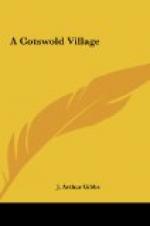Major de Freville’s country as a whole is more suited to the “houndman” than for him who hunts to ride. The hills, save in one district, are so severe that hounds often beat horses; the result is, many are tempted to station themselves on the top of a hill, whence a wide view is obtainable, and trust to the hounds coming back after running a ring. Given the right sort of horse, however—short-backed, thoroughbred if possible, and with good enough manners to descend a steep place without boring and tearing his rider’s arms almost out of their sockets—many a fine run may be seen in this wild district. Much of the arable land has gone back to grass, so that it is quite a fair scenting country; and the foxes are stronger and more straight-necked than in more civilised parts. One of the best days the writer ever had in his life was with these hounds. Meeting at Puesdown, they ran for an hour in the morning at a great pace, with an eight-mile point; whilst in the afternoon came a run of one-and-a-half hours, with a point of somewhere about ten miles.
With the exception of a small vale between Cheltenham and Tewkesbury, which is very good indeed, the Puesdown country is about the best, the undulations being less severe than in other parts.
On Thursdays Cirencester commands Mr. Miller’s Braydon country. This country is a very great contrast to that which is ridden over on Tuesdays and Wednesdays, and requires a very stout horse. It rides tremendously deep at times; and the fences, which come very frequently in a run, owing to the small size of the enclosures, are both big and blind. It is practically all grass. But there are several large woodlands, with deep clay rides, in which one is not unlikely to spend a part of Thursday; and these woods, owing in part to the shooting being let to Londoners, are none too plentifully provided with foxes. Wire, too, has sprung up in some parts of Mr. Miller’s Braydon country. Few people have large enough studs to stand the wear and tear of this fine, wild country; consequently the fields are generally small. Sport, though not so good as it used to be, is still very fair, and to run down to Great Wood in the duke’s country is sufficient to tax the powers of the finest weight-carrying hunter, whilst only the man with a quick eye to a country can live with hounds. It is often stated that blood horses are the best for galloping through deep ground. This is true in one way, though not on the whole. Thoroughbred horses are practically useless in this sort of country; their feet are often so small that they stick in the deep clay. A horse with small feet is no good at all in Braydon. A short-legged Irish hunter, about three parts bred, with tremendous strength in hocks and quarters, and biggish feet, is the sort the writer would choose. If up to quite two stone more than his rider’s weight, and a safe and temperate fencer, he will carry you well up with hounds over any country. A fast horse is not required; for a racer that can do the mile on the flat at Newmarket in something under two minutes is reduced in really deep ground to an eight-mile-an-hour canter, and your short-legged horse from the Emerald Isle will leave him standing still in the Braydon Vale.




